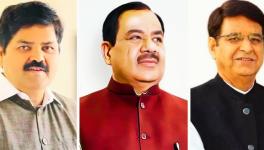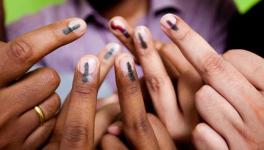Junagadh: BJP Banks on ‘Modi wave’, Congress Wishes to Repeat 2017 Assembly Poll Performance
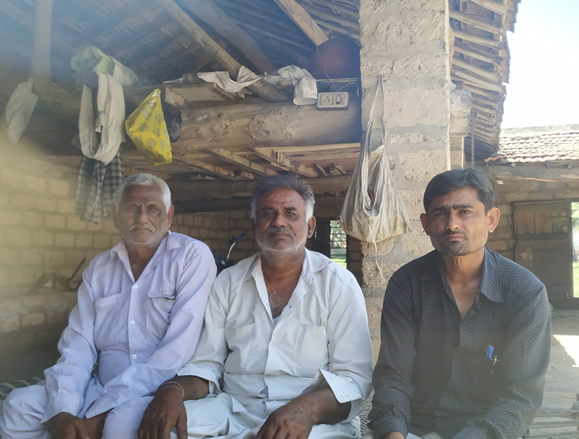
Farmers from Badalpara Village, Junagadh. Picture credit: Damayantee Dhar
Junagadh Lok Sabha constituency covers seven Assembly segments – Junagadh, Visavdar, Mangrol, Somnath, Talala, Una and Kodinar, and is spread across two districts – Junagadh and Gir Somnath.
In 2014 Lok Sabha election, Rajeshbhai Naranbhai Chudasma of BJP won the seat, defeating Congress’s Punjabhai Bhimabhai Vansh by a margin of 1.35 lakh. Punjabhai Vansh later won from the Assembly seat of Una in 2017 Gujarat state elections.
While the BJP has renominated their candidate Rajeshbhai Chudasma, Congress has again pitted Punjabhai Vansh against him. Notably, the Junagadh Lok Sabha constituency has been a BJP bastion since 1991, and Congress has won the seat once in 28 years – in 2004. Despite this, the BJP had lost all the seven Assembly seats that fall under the Junagadh Lok Sabha constituency in 2017 Gujarat Assembly polls. The loss came in the wake of massive dalit protests in the region following dalit flogging in Una, acute agrarian crisis, declaration of freight corridor through agrarian lands of the region and a blow to Dinu Bogha Solanki, former BJP MLA and MP and illegal mining baron after being accused in murder of RTI activist Amit Jethwa.
While Congress is trying to bank on its performance in the Assembly election, and keep up the fervour, BJP is heavily banking on a ‘Modi wave’.
Chudasma has been heard bringing up his role in setting up of a civil hospital in Junagadh and some road projects along the coastal region of the district. However, his campaign speeches do not fail to mention PM Modi and the importance of re-electing him as the prime minister.
“People of Junagadh will vote for Modi and would like to see him form the government once again,” said a local BJP member of Kodinar, Gir Somnath district.
“There is no Modi wave in this region. One of the prime reasons that Junagadh Lok Sabha constituency has been a stronghold of the BJP is the rise and influence of BJP leader Dinu Bogha Solanki in the region. He owns Junagadh; district administration, local police and civic body function as per his whims and fancy,” said Mahesh Makwana, a dalit social activist.
Solanki, who is a former MLA of Kodinar and was the Member of Parliament of Junagadh in from 2009 to 2014, is the most influential BJP leader in the region.
“Solanki has been a close aide of Amit Shah and is the illegal mining baron of the area. Solanki and his men control every government body in Junagadh. Solanki has about 200 murder cases against him but he has been so far accused in only one – Amit Jethwa murder case. His men including hired goons, his brothers and relatives have countless cases of thrashing, rapes, threatening and move around flaunting fire arms,” shares Makwana.
“When Solanki was thriving on the fear of people, RTI and environment activist Amit Jethwa was the first to file a PIL against his illegal mining. Jethwa was, however, murdered in front of Gujarat High Court, Ahmedabad in 2010 in course of the ongoing case. After Jethwa’s murder, his father pursued the case and for the first time, Solanki was named as prime accused in a murder case,” he adds.
Even though the trial of Amit Jethwa murder case came as a blow for the BJP and Solanki, who subsequently could not run for 2014 Lok Sabha election, his activities in the region including illegal mining continue.
Following death of Jethwa, Makwana took on Solanki, and filed one more PIL, and decided to contest local body election in 2015.
Also read: Elections 2019: Amidst Drought and Agrarian Distress, Surendranagar Farmers Say No to BJP
Makwana told Newsclick, “Local body election is a farce here, as it’s Solanki who decides the candidates and the winner. Anyone else trying to file a nomination has been threatened, thrashed and even murdered by Solanki or his men. When I declared my nomination for the local body election, I was threatened and then shot at by Solanki but narrowly escaped. Despite these events, I refused to back out.”
He further alleged, “About a year ago, about 20 of Solanki’s goons thrashed me with iron pipes in broad daylight amid a bustling town. I was lying in a pool of blood, and nobody dared to help me. Eventually, when I was taken for treatment, hospitals in Junagadh, both private and government, refused to admit me. I was treated in a hospital more than 100 kilometre away.” Makwana now moves around with a court-appointed armed guard.
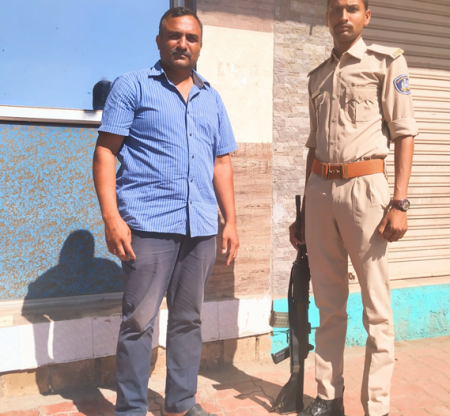
Makwana with his armed guard. Picture courtesy: Damayantee Dhar
“Solanki’s hold on the constituency has been slipping away since Jethwa and Makwana brazenly stood up against him. People might not still come out openly against Solanki, but he no longer influences how people vote,” says a local shopkeeper of Kodinar on the condition of anonymity.
Notably, BJP banked on PM Modi to open their campaign in the constituency. Modi, who began his Lok Sabha election campaign for Gujarat from Junagadh on April 10, did not forget to mention Pakistan in his speech.
Recounting Sardar Patel and his role in uniting India and reminding that Junagadh had been on the brink of joining Pakistan during independence, he asked, “If Sardar would not have brought Junagadh under India where would it have been?”
“With Pakistan,” the crowd shouted in response.
However, with more than 50% of Junagadh Lok Sabha constituency falling under rural areas, the region has been facing water crisis and agrarian crisis. At such a time, a speech like this seems to have left hardly any impression.
“Farmers are very distressed. This government only supports industries. We are dependent on rain for irrigation and each time our crop fails, we don’t get enough insurance cover. It’s an insult to be handed five or 10% of the money that we have paid as insurance premium throughout the year. Besides, we have not been getting sustainable price for groundnuts for years,” says Govindbhai Barad, a farmer of Badalpara village of Somnath.
“To add to our troubles, Gujarat government has notified that a commercial freight train corridor will be passing through our agricultural land in 19 villages, and 32 villages will be affected because of the side effects of the project,” says Arjan Barad, another farmer from Badalpara.
Badalpara is one of the 19 villages from where the fright corridor will pass through the agrarian land.
The dalits and tribals who form about 11% of the electoral population of the constituency have been moving away from the BJP post the incident of flogging of dalits in Una. Following the incident, the region witnessed multiple dalit movements and later mass conversion of Dalits into Buddhism.
Muslims, who comprise about 12.5% of the electoral population in the region, mostly don’t vote for BJP. However, Kharwa community, who are primarily fishermen of the coastal region of the constituency, comprising about 2 lakh votes, have been a core BJP vote bank despite multiple issues.
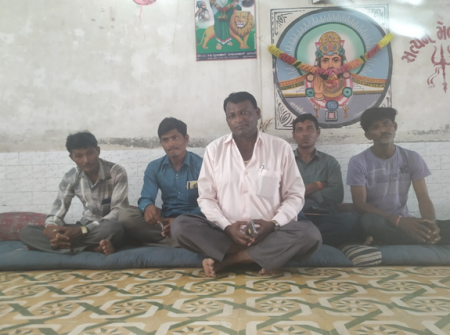
Fishermen of Kharwa Community. Picture courtesy: Damayantee Dhar
“Our prime issue that has remained unheard for years is that we don’t have any document of ownership of the land on which we have built our houses. We have been living here for generations,” says Premjibhai, a fisherman of Dhamlej village, Somnath.
“Another issue is that the subsidy of kerosene that is given to fishermen is not enough, and we do not get it regularly. Currently, we buy kerosene at Rs 72 per litre and later the subsidy amount is reimbursed to us. The last subsidy we received was about five months back,” shares Premjibhai.
“Nonetheless, we fishermen will vote for the BJP. We always have, for he (Modi) stands for nationalism,” he adds.
Also read: Elections 2019: Whichever Party We Vote for, Will Favour Reliance, Say Villagers of Jamnagar
Get the latest reports & analysis with people's perspective on Protests, movements & deep analytical videos, discussions of the current affairs in your Telegram app. Subscribe to NewsClick's Telegram channel & get Real-Time updates on stories, as they get published on our website.









